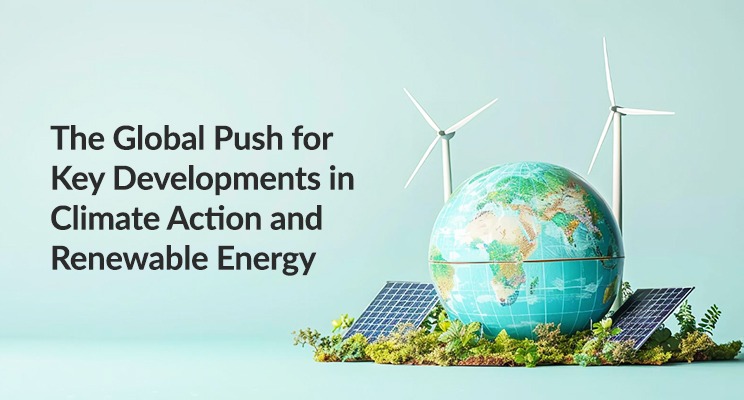As we approach 2030, climate action is more pressing than ever. Governments and industries are intensifying their efforts to shift towards sustainable energy sources, motivated by policy changes and technological progress. This article examines significant global initiatives influencing the renewable energy sector, focusing on investments, innovations, and the economic effects of the green transition.

The Urgency of Climate Action: A Race Against Time
The climate goals for 2030 established by international agreements such as the Paris Agreement call for urgent and decisive action. As greenhouse gas emissions continue to rise, countries are feeling the pressure to speed up their decarbonisation efforts. Failure to meet these targets could lead to $23 trillion in annual climate-related economic losses by 2050, alongside irreversible biodiversity loss and extreme weather events.
Nations around the globe are adopting bold policies, ramping up investments in green technology, and setting ambitious targets for carbon neutrality. However, reaching these objectives requires more than just promises—it necessitates the immediate implementation of sustainable policies and the integration of new technologies.
India's Lithium Investments: A Game-Changer for Renewable Energy
India, recognised as one of the fastest-growing economies, is making notable progress in securing lithium resources, crucial for electric vehicle (EV) batteries and renewable energy storage. The recent discovery of extensive lithium reserves in Jammu and Kashmir positions India as a significant contender in the global battery supply chain.
Through investments in domestic lithium processing and battery manufacturing, India seeks to lessen its dependence on imports, enhance its EV market, and support its ambitious renewable energy goals. These advancements indicate a move towards self-sufficiency in clean energy technologies.
Renewable Energy Advancements: Cleaner and More Affordable Solutions
Recent technological advancements are enhancing the efficiency and affordability of renewable energy sources such as solar, wind, and hydro. Innovations in battery storage, smart grids, and hydrogen fuel are facilitating a broader shift away from fossil fuels for both businesses and consumers.
For example, offshore wind farms are emerging as a key component of the global renewable energy landscape, and improvements in solar panel efficiency are making clean energy increasingly accessible. Additionally, the falling costs of renewable technologies are speeding up their implementation, paving the way for a sustainable and budget-friendly energy future.
Fluence’s Expansion in Japan: Strengthening Energy Storage
Fluence, a prominent player in energy storage technology, is broadening its operations in Japan to aid the nation in its shift towards a low-carbon future. Renowned for its cutting-edge technology sector, Japan is ramping up investments in battery storage solutions to stabilise its renewable energy grid.
Fluence’s growth in Japan line with the country’s objective to lessen its reliance on fossil fuels and improve energy resilience. By utilising more efficient battery storage systems, Japan can effectively incorporate renewable energy sources, guaranteeing a stable and dependable power supply.
Government Push: Policies Driving the Green Transition
Governments around the globe are implementing policies to speed up the transition to renewable energy. Initiatives like the European Union’s Green Deal and the United States Inflation Reduction Act are designed to encourage both businesses and individuals to embrace cleaner energy options.
These measures feature tax credits, subsidies for environmentally friendly projects, and tougher emissions regulations. By offering financial incentives and regulatory backing, governments are helping industries focus on sustainability while making the shift economically feasible.
MSIG Asia and RiskPoint Partnership: Strengthening Climate Resilience
Insurance and risk management companies are essential in tackling climate-related risks. MSIG Asia’s collaboration with RiskPoint seeks to enhance financial protection against disasters caused by climate change.
Through the provision of climate risk insurance solutions, both businesses and governments can lessen the financial repercussions of severe weather events. This partnership underscores the private sector’s commitment to confronting the challenges posed by a shifting climate.
The Economic Impact of the Renewable Energy Shift
The transition to renewable energy is more than just an environmental imperative; it represents a significant economic opportunity. The move towards green energy is generating millions of jobs globally, especially in the areas of manufacturing, installation, and maintenance of renewable energy systems.
Beyond job creation, green innovation is opening up new business avenues in fields like electric mobility, energy storage, and circular economy initiatives. As nations commit to clean energy investments, they are simultaneously promoting economic growth and establishing technological leadership.
Scotland’s Subsea Cable Investment: Enhancing Energy Connectivity
Scotland is strategically investing in subsea cable infrastructure to enhance energy distribution and bolster its renewable energy goals. These high-capacity cables will link offshore wind farms to the mainland grid, facilitating efficient energy transfer and decreasing dependence on fossil fuels.
By expanding its energy infrastructure, Scotland is solidifying its status as a leader in renewable energy, catering to both domestic requirements and potential exports to other countries.
The global movement for climate action is gaining momentum, as countries pour resources into renewable energy, enhance battery storage technologies, and adopt ambitious policies. Initiatives like India’s investments in lithium, Japan’s expansion of energy storage, and Scotland’s infrastructure projects indicate a significant shift towards a sustainable future.
Despite the challenges that lie ahead, the economic and environmental advantages of this transition are clear. By taking action now, nations can achieve their 2030 climate targets while also creating a more resilient and prosperous world.


